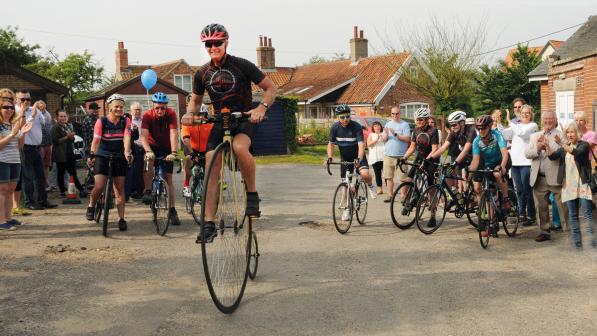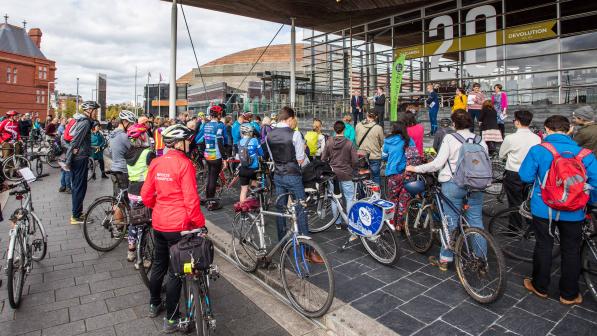Meet our members: Roy Spilsbury

When you’ve got about three days to spare, Dan, I’ll tell you the rest,” Roy signs off cheerfully at the end of our telephone interview. He’s a torrent of information, rattling off arguments and anecdotes in the conversational equivalent of copper plate handwriting. His diction is polite and precise, belying, I suspect, a terrier-like disposition; his long history of cycle campaigning has chalked up some notable successes.
“The one that attracts most attention is the seven-year battle to get cycling onto Llandudno promenade as part of National Cycle Route 5,” he says. “I kept pecking away at that. Every time the council mentioned the promenade, up I would pop with a letter.”
Other campaigns he fought and won include the establishment of a nature reserve in Prestatyn, and the opening up of an old railway line between Prestatyn and Dyserth. (Roy lives in North Wales and rides with Chester & North Wales CTC.)
But he’s keen to stress that cycle campaigning “isn’t just about pedalling on designated off-road paths. It’s also making inroads into the culture of the roads. An initiative within my local cluster here in North Wales, where I think we’re a market leader, is Operation SNAP, which involves the use of head cameras for pursuing prosecutions.”
It has never been more important to have Cycling UK than now. I’ve been a rights rep for years and I’ve always been conscious of the fact that I’m not primarily working for Cycling UK, I’m working for society. Cycling UK is my tool
Roy Spilsbury, Cycling UK member and campaigner
Roy does a lot of letter writing to win support for his arguments. “I’ve always believed in getting into the media,” he says, “getting into the newspapers, making points.” The ‘local rag’, however, is just the tip of the iceberg. He has his own website, Cycling in North Wales, which has racked up around four million hits.
“I use social media as well, and I do YouTubes – although I’m still a student in that area. Whenever cycling comes up in the media, I respond on social media, sending a hyperlink to the YouTube video I’ve done. I put the words ‘Cycling UK’ on the video.”
Roy has embraced the change from CTC to Cycling UK. “I have little patience with those who bemoan the fact that CTC is not a club,” he says. “I’m delighted by the change of its name to Cycling UK. Nobody’s got more fondness for the old CTC and the Winged Wheel than me; I’ve written articles on it. But the switch to the new title and logo has given me much greater impact in contacts with the media and the local community.
“Moving to a charity, I have no problem with. There’s an awful lot of work going into campaigning and so on which is charitable delivery. So I’m fully supportive.

“Cycling UK is an institution. It’s responded to the times as times have changed. It’s hit its lows but it’s never been confronted with the challenges that we have now, because the world has changed. Our physical playground has changed. It has never been more important to have Cycling UK than now.
“I’ve been a rights rep for years and I’ve always been conscious of the fact that I’m not primarily working for Cycling UK, I’m working for society. Cycling UK is my tool.”
Unusually, perhaps, for someone who is 86, Roy’s eye seems firmly fixed on the future. “Like many organisations – and I think this is a problem that Cycling UK is trying to confront at the moment – there’s the issue of the ageing population of the membership.
"What I would like to see is an associate membership or something of that ilk, where people could perhaps receive the magazine or some form of regular update but not the third-party insurance. A phrase went through my head this morning, a sort of sales pitch for a potential associate membership: ‘What price your grandchild’s future?’”
Paris disagreement
“It was me that triggered off, through the CTC Forum in 2007, the complaint against Matthew Paris. The year before, four of my chums in Rhyll Cycling Club were killed by a motorist. And a year later, Matthew Paris is writing in The Times about decapitating cyclists. It became the biggest ever complaint to the Press Complaints Council.”




